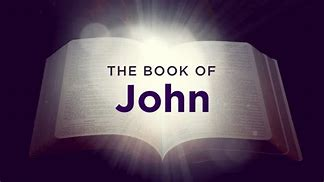Before Abraham Was, I Am - {Interlinear <Greek>}
48 - The {οἱ<ho>} Jews {Ἰουδαῖοι<Ioudaios>} answered {Ἀπεκρίθησαν<apokrinomai>} • {καὶ <kai>} • {εἶπαν<legō>} him, {αὐτῷ·<autos>} “Are → we {ἡμεῖς<egō>} not {οὐ <ou>} right {καλῶς<kalōs>} in → saying {λέγομεν<legō>} that {ὅτι<hoti>} you {σὺ <sy>} are {εἶ<eimi>} a → Samaritan {Σαμαρείτης<Samareitēs>} and {καὶ<kai>} have {ἔχεις; <echōa>} → demon?” {δαιμόνιον<daimonion>}
49 - Jesus {Ἰησοῦς·<Iēsous>} answered, {Ἀπεκρίθη<apokrinomai>} “I {ἐγὼ<egō>} do → not {οὐκ<ou>} have {ἔχω,<echō> a → demon, {δαιμόνιον<daimonion>} but {ἀλλὰ <alla>} I → honor {τιμῶ<timaō>} my {μου,<egō>} Father, {τὸν πατέρα<hopatēr>} and {καὶ<kai>} you {ὑμεῖς<sy>} dishonor {ἀτιμάζετέ<atimazō>} me. {με.<egō>}
50 - Yet {δὲ<de>} I {ἐγὼ<egō>} do → not {οὐ<ou>} seek {ζητῶ<zēteō>} my {μου·<egō>} own ← glory; {τὴν δόξαν<ho doxa>} there → is {ἔστιν<eimi>} One who {ὁ<ho>} seeks {ζητῶν<zēteō>} it,• and {καὶ<kai>} he → is → the → judge. {κρίνων.<krinō>}
51 - Truly, {Ἀμὴν<amēn>} truly, {ἀμὴν<amēn>} I → say {λέγω<legō>} to → you, {ὑμῖν· <syifἐάν<ean>} anyone {τις<tis>} keeps {τηρήσῃ,<tēreō>} my {ἐμὸν<emos>} word, {τὸν λόγον<ho logos>} he → will → never {οὐ μὴ εἰς τὸν αἰῶνα.<ou mēe is ho aiōn>} see {θεωρήσῃ<theōreō>} death.” {θάνατον<thanatos>}
52 - The {οἱ<ho>} Jews {Ἰουδαῖοι·<Ioudaios>} said {Εἶπον<legō>} to → him, {αὐτῷ <autos>} “Now {νῦν<nyn>} we → know {ἐγνώκαμεν<ginōskō>} that {ὅτι<hoti>} you → have {ἔχεις. <echō>} a → demon! {δαιμόνιον<daimonion>} Abraham {Ἁβραὰμ <Habraam>} died, {ἀπέθανεν<apothnēskō>} as {καὶ<kai>} did • the {οἱ<ho>} prophets, {προφῆται,<prophētēs>} yet {καὶ<kai>} you {σὺ<sy>} say, {λέγεις·<legō>} ‘If {ἐάν<ean>} anyone {τις<tis>} keeps {τηρήσῃ,<tēreō>} my {μου<egō>} word, {τὸν λόγον<ho logos>} he → will → never {οὐ μὴ εἰς τὸν αἰῶνα.<ou mē eis ho aiōn>} taste {γεύσηται<geuomai>} death. {’θανάτου<thanatos>}
53 - Are {εἶ<eimi>} you {σὺ<sy>} greater {μείζων<meizōn>} than → our {ἡμῶν <egō>} father {τοῦ πατρὸς<ho patēr>} Abraham, {Ἁβραάμ,<Habraam>} who {ὅστις <hostis>} died {ἀπέθανεν;<apothnēskō>} ? {μὴ<mē>} And {καὶ<kai>} the {οἱ<ho>} prophets {προφῆται<prophētēs>} died! {ἀπέθανον.<apothnēskō>} Who {τίνα <tis>} do you make → yourself {σεαυτὸν<seautou>} out to be?” {ποιεῖς;<poieō>}
54 - Jesus {Ἰησοῦς·<Iēsous>} answered, {Ἀπεκρίθη<apokrinomai>} “If {ἐὰν<ean>} I {ἐγὼ<egō>} glorify {δοξάσω<doxazō>} myself, {ἐμαυτόν,<emautou>} my {μου<egō>} glory {ἡ δόξα<ho doxa>} is {ἐστιν·<eimi>} nothing. {οὐδέν<oudeis>} It → is {ἔστιν <eimi>} my {μου<egō>} Father {ὁ πατήρ<ho patēr>} who {ὁ<ho>} glorifies {δοξάζων <doxazō>} me, {με <egō>} of • whom {ὃν<hos>} you {ὑμεῖς<sy>} say, {λέγετε<legō> ‘ὅτι<hoti>} He → is {ἐστιν,<eimi>} our {ἡμῶν<egō>} God.’ {θεὸς<theos>}
55 - But {καὶ<kai>} you → have → not {οὐκ<ou>} known {ἐγνώκατε<ginōskō>} him. {αὐτόν,<autos>} I {ἐγὼ<egō>} • {δὲ<de>} know {οἶδα<oida>} him. {αὐτόν.<autos>} If {κἂν <kan>} I → were → to → say {εἴπω<legō>} that {ὅτι<hoti>} I → do → not {οὐκ <ou>} know {οἶδα <oida>} him, {αὐτόν,<autos>} I → would → be {ἔσομαι<eimi>} a → liar {ψεύστης·<pseustēs>} like {ὅμοιος<homoios>} you, {ὑμῶν<sy>} but {ἀλλὰ <alla>} I → do → know {οἶδα<oida>} him {αὐτὸν<autos>} and {καὶ<kai>} I → keep {τηρῶ.<tēreō>} his {αὐτοῦ <autos>} word. {τὸν λόγον<ho logos>}
56 - Your {ὑμῶν<sy>} father {ὁ πατὴρ<ho patēr>} Abraham {Ἁβραὰμ <Habraam>} rejoiced {ἠγαλλιάσατο<agalliaō>} that {ἵνα<hina>} he → would → see {ἴδῃ<horaō>} my {τὴν ἐμὴν<ho emos>} day. {τὴν ἡμέραν<ho hēmera>} • {καὶ<kai>} He → saw {εἶδεν<horaō>} it • and {καὶ<kai>} was → glad.” {ἐχάρη.<chairō>}
57 - So {οὖν<oun>} the {οἱ<ho>} Jews {Ἰουδαῖοι<Ioudaios>} said {εἶπον<legō>} to {πρὸς <pros>} him, {αὐτόν·<autos>} “You → are {ἔχεις,<echō>} not yet {οὔπω <oupō>} fifty {πεντήκοντα<pentēkonta>} years {ἔτη<etos>} old, • and {καὶ<kai>} have → you → seen {ἑώρακας;<horaō>} Abraham?” {Ἁβραὰμ<Habraam>}
58 - Jesus {ὁ Ἰησοῦς·<ho Iēsous>} said {Εἶπεν<legō>} to → them, {αὐτοῖς<autos>} “Truly, {ἀμὴν<amēn>} truly, {ἀμὴν<amēn>} I → say {λέγω<legō>} to → you, {ὑμῖν· <sy>} before {πρὶν<prin>} Abraham {Ἁβραὰμ<Habraam>} was, {γενέσθαι<ginomai>} I {ἐγώ <egō>} am.” {εἰμι.<eimi>}
59 - So {οὖν<oun>} they picked up {ἦραν<airō>} stones {λίθους<lithos>} to {ἵνα <hina>} throw {βάλωσιν<ballō>} at {ἐπ᾽<epi>} him, {αὐτόν.<autos>} but {δὲ<de>} Jesus {Ἰησοῦς <Iēsous>} hid {ἐκρύβη<kryptō>} himself ← and {καὶ<kai>} went {ἐξῆλθεν <exerchomai>} out of {ἐκ<ek>} the {τοῦ<ho>} temple. {ἱεροῦ.<hieron>}

Jesus promises a freedom that no one else can give based on truth that he alone possesses. As the Messiah, he has come to set prisoners free (Luke 4:16–21; Isa. 61:1–3). True freedom can be found only in the “right paternity”: not everyone who claims Abraham as their father has God as their Father, “for not all who are descended from Israel belong to Israel” (Rom. 9:6). None can claim God as their Father who won’t have his Son as their Savior.
If our spiritual genealogy includes only our earthly heritage (as was true of the “children of Abraham” in this passage), we may be religious, but we are still spiritual orphans. True spiritual heritage requires a connection to one who existed long before Abraham, namely, Jesus: “before Abraham was, I am” (John 8:58). Only through the gospel can we be rescued from the dominion of darkness (Col. 1:13), where Satan is father, and be brought into the family of God, where we are given the full rights and delights of the children of God (John 1:12; Gal. 4:5; 1 John 3:1–3).
References:
All contents are reposted from ESV.org.
“Scripture quotations are from The ESV® Bible (The Holy Bible, English Standard Version®), copyright © 2001 by Crossway, a publishing ministry of Good News Publishers. Used by permission.
All rights reserved.”
Comments